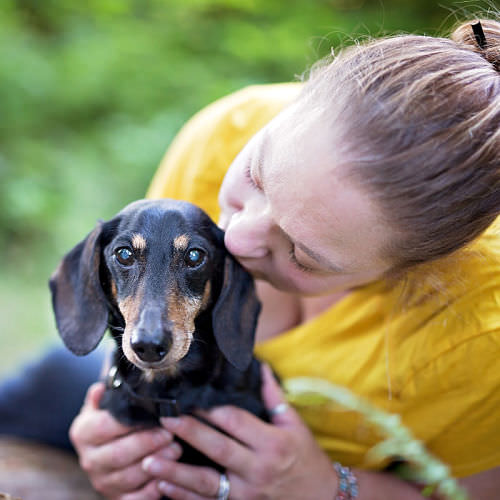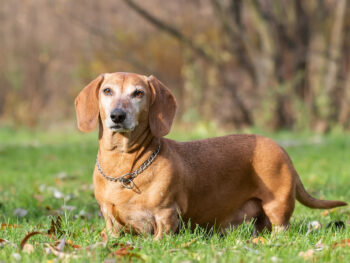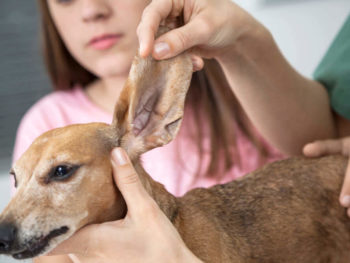Dachshunds, as with every dog breed, have certain health issues that occur more frequently within their “genetic pool.”
Smart Dachshund owners will educate themselves so that they can recognize a health issue in its early stages.
Being aware of common health issues in Dachshunds can equip an owner with knowledge that could help prevent the issue from occurring or will minimize any issues that do occur.
This article lists the 12 most common health issues in Dachshunds.
Why are These Health Problems More Common in Dachshunds?
Dachshunds have a very unique body type when compared to most other breeds.
Their body is quite long and sits very low to the ground, on top of having very short legs.
This trait is called disproportional dwarfism, or chondrodysplasia.
Disproportionate dwarfism is when some parts of the body are small, and others are of average size or above-average size.
This distinct skeletal structure makes them prone to genetic problems specific to long-bodied dogs, as well as health problems related to their environment.
12 of the Most Common Health Issues in Dachshunds
Based on my research and experience, these 11 health issues cause the most problems for the Dachshund breed:
Back Disease
Back issues are the top health problem Dachshunds encounter; 25% will experience back issues in their lifetime.
According to the UC Davis Veterinary Genetics Laboratory,
“Chondrodysplasia [can]… impact the health of animals through an abnormal process that causes premature degeneration of the intervertebral discs.”
Back problems are very common in Dachshunds. In fact, approximately 25% of Dachshunds will experience back issues in their lifetime.
This predisposition of spinal disks to age early is referred to as Intervertebral Disk Disease (IVDD).
It causes the vertebrae and disks to become brittle and can result in problems similar to a slipped or ruptured disks in humans.
IVDD-related spinal injuries (well, any really) can be extremely painful and long-lasting, sometimes leading to permanent damage to the spine and paralysis.
Common-sense ownership can help minimize back issues in your Doxie.
- Exercise your dog; it promotes strong muscles and healthy tissues.
- Discourage your Dachshund from jumping up on or down from furniture or other to difficult and high places (off the bed, into the car, etc.) as this causes shock on the disks.
- When you lift or carry your dog, support her weight in both the rear and front ends so their spine is not stressed.
Dental Issues
Dental issues are common in Dachshunds.
Dachshunds are also predisposed to dental issues.
One of the primary reasons is that the chondrodysplasia mentioned above can result in the crowding of teeth in the jaw.
Teeth affected by crowding have lowered defenses to periodontal disease due to their propensity to trap food, plaque, and calculus leading to infection and inflammation. (Source)
To protect your dog’s teeth, it’s important to have them cleaned regularly by a professional and develop a home routine to help prevent tartar from building up.
If your Dachshund won’t let you brush their teeth, you may want to consider getting your dog anesthesia-free teeth cleaning from a licenced professional.
Besides bad teeth, Dachshunds are prone to bad breath (here are some tips for dealing with it).
Skin Issues
While any dog can suffer from skin problems, Dachshunds are prone to developing a wide variety of skin-related issues ranging from allergies to color dilution alopecia.
Find out more here: The 6 most common skin issues in Dahcshunds and what to do about them.
Cushing’s Disease (Hyperadrenocorticism)
Cushing’s Disease is caused when the adrenal glands produce too much of a steroid hormone called cortisone.
This hormone imbalance usually develops slowly so can be mistaken for aging symptoms.
The symptoms of Cushing’s Disease can be mistaken for signs of aging.
Symptoms include excessive drinking, urination accidents in the house, hair loss, increased appetite, and weight gain.
If you notice any of these symptoms it’s important to have your dog evaluated by your vet.
Fortunately, Cushing’s Treatment is treatable with oral medications that can help your dog lead a longer and more comfortable life.
In extreme cases the overactive adrenal glands can be surgically removed.
Obesity
The Dachshund is listed in the Banfield Pet Hospital as one of the top 10 breeds at highest risk of obesity.
Obesity can trigger a variety of other health issues.
One most obvious is the back disorders discussed above because extra belly weight puts stress on the spine.
Less obvious include arthritis (obese dogs have been shown to need medicine for osteoarthritis 3 years earlier than non-obese dogs) and higher anesthetic risk in surgery.
Do your homework to choose a healthy food for your dog, feed it appropriate quantities, and watch for these signs to make sure your Dachshund gets enough exercise.
Cancers/Tumors
Dachshunds have a higher than average risk of developing cancers of the skin, fat cells, and anal sacs.
This includes a particular risk of developing mast cell tumors and squamous cell carcinoma.
Dachshunds have an increased risk of getting cancer.
Other cancers more common in Dachshunds than some in other breeds include anal sac cancer, liposarcoma, and mammary gland cancer.
It’s important to check your dog’s skin regularly for any abnormal lumps on or just under the skin’s surface and to have your vet check any lumps you find.
Cardiac Disorders
DMVD (degenerative mitral valve disease) is a leaky heart valve issue common in Dachshunds. It usually appears when the dog is between 8 and 10 years of age.
Regular checkups should catch this condition in the early stages; it can be controlled with medication.
Keeping your dog’s weight down is important so the heart doesn’t need to work harder than normal.
Seizures, Lafora Disease, and Other Non-spinal Neurologic Disorders
Dachshunds are prone to several neurologic disorders including Lafora disease, epilepsy, and narcolepsy.
If you’re never heard of Lafora disease (LD) before, it’s an inherited, late onset, progressive myoclonic epilepsy.
It appears as brief, shock-like jerks of a muscle or a group of muscles that usually only lasts a second or two.
Any Dachshund can have it but there is a high prevalence in the miniature Wirehaired Dachshund – up to 20% of miniature wire hairs can be affected.
Symptoms of non-spinal neurologic disorders can include seizures, jerking motions, tremors, imbalance, excessive sleeping, or weakness.
If you notice any of these symptoms it’s important to have your Doxie checked out by a vet right away.
Eye Problems
Dachshunds are prone to several different eye problems. Some are extremely painful; others can cause blindness if not treated right away.
Cataracts and
Glaucoma is a very painful disease that can lead to blindness if not treated.
Cataracts are common in older Dachshunds and can cause blindness, but surgery can restore sight in some cases.
Dry eye (known as KCS, or keratoconjunctivitis sicca) results in itchy, sore eyes, and eye infections. It is treated with an ointment that you apply daily.
Liver Disease
Dachshunds are more likely than most breeds to have a liver disorder called portosystemic shunt (PSS).
This is a hereditary condition in which the liver can’t effectively remove toxins from the bloodstream.
Surgery is sometimes needed, but many times you can treat it with medication and a special diet.
Dachshund Stomach Issues
It’s not uncommon for Dachshund’s to experience stomach issues.
Some are merely sensitive to certain foods or abrupt food changes.
Others can suffer from gastroenteritis, a term referring to stomach issues resulting in inflammation of the gastrointestinal tract.
Gastroenteritis has an underlying cause such as parasites, dietary issues, etc.
Dachshunds tend to be more prone to developing hemorrhagic gastroenteritis.
Dachshunds are one of the breeds at higher risk of developing hemorrhagic gastroenteritis (HGE).
HGE can have similar symptoms as gastroenteritis but has a severe onset and no underlying cause can be found.
Dachshund stomach issues must be addressed immediately; HGE can be life-threatening if untreated.
The main symptoms are bloody diarrhea and sudden onset.
Immune System Disorders
An autoimmune disease causes the immune system to attack the body’s own tissues and cells.
Dachshunds are predisposed to a disease called Immune-Mediated Thrombocytopenia, in which the body attacks its own platelets and clotting function is impaired.
30% of dogs with this condition die from it, many others respond to medical treatment but have recurrent bouts throughout their life.
Raising a Healthy Dachshund
Any of these health problems can shorten a Dachshund’s lifespan.
Although we wish we could control all factors that cause common health issues in Dachshunds, certain environmental and hereditary factors are beyond our control.
While you can’t control all factors, you can take preventative measures to keep your Dachshund healthy.
What IS in your control is doing everything in your power to make your Doxie as healthy as possible.
Healthy Dachshunds are more resistant to health issues and many times can avoid or minimize symptoms.
Close to the Ground, Closer to Your Heart
Our Dachshund’s unique structure does make them prone to certain health issues, but it also makes us love them even more.


About the Author: Through her 17 years of owning and caring for Dachshunds, and almost 10 years researching and writing about them, JW has become a respected expert in the Dachshund community. Read more about her here.














 Why Does My Dachshund Have Bad Breath? (and What You Can Do About It)
Why Does My Dachshund Have Bad Breath? (and What You Can Do About It)


